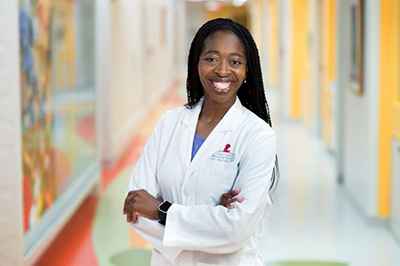Dr. Obeng’s parents instilled in her a value for education, and she’s putting it to use treating patients and researching new therapies and cures.
By Tom Charlie
Ask Esther Obeng, M.D., Ph.D., about her job title, and she’s liable to offer up a variety of terms: physician-scientist, researcher, attending physician and assistant faculty member.
But there’s another title, one that preceded her position at St. Jude Children’s Research Hospital, that’s a particular point of pride for her.
“I’m a first-generation American,” she said.
Obeng’s father came to the U.S. from the West African nation of Ghana. Her mother emigrated from the Caribbean. They brought to their new country a strong work ethic and a yearning for excellence.
“Both of them instilled in myself and my brothers the importance of obtaining a good education in order to achieve goals and accomplish something positive.”
Obeng, to be sure, got that good education, earning a Bachelor of Science, medical and doctorate degrees at the University of Miami. And she’s put it to use not only to treat patients as a physician, but to conduct research aimed at finding new therapies and cures.
“And that’s one of the reasons that I ended up at St. Jude,” she said. “I was very interested and excited for the opportunity to take part in such a novel mission, to try to cure the incurable.”
Apart from the science and medicine, there’s another reason Obeng has found a home at St. Jude. After arriving, she learned about the research hospital’s history as the first fully integrated children’s hospital in the South and about its continuing focus in the areas of diversity, equity, and inclusion.
“That’s been a pleasant surprise and something that I’m very proud to be a part of.”
Contributions from donors make it possible for doctors and scientists like Obeng to conduct research and help find cures while ensuring no family treated at St. Jude ever receives a bill. Obeng is able to attend to bone-marrow-transplant patients and has her own research lab. That combination of functions, research along with treating patients, appeals to her.
One of Obeng’s favorite experiences came when she emerged from her lab one day and saw a patient who previously had experienced complications waving to her as she left the hospital to go home.
“I think that connection — being able to be in the lab five minutes ago and then five minutes later see your patient, see that they made it home, I think is one of the special St. Jude moments,” Obeng said.
In her lab, Obeng delves into some of the most vexing mysteries of leukemia, such as why normal cells turn cancerous and how cancer cells can become resistant to drugs.
“What we’ve been focused on is trying to identify how different genetic changes or mutations cause normal cells to grow like cancer cells, with the goal of trying to find specific agents or therapies that will wipe out those cancer cells without causing much more toxicity,” she said.
Obeng’s lab is working with a number of different patient groups — those with leukemia and sickle cell disease, as well as children who have undergone bone marrow transplants — to design studies to identify cancer-causing mutations and then develop clinical trials with therapies that target them.
“One of the reasons that I study the research that I do is I had a patient who had a type of bone marrow failure syndrome. And her parents said, when she ultimately passed away, that they knew that they received the best care possible, and they just wished we knew something more,” Obeng said.
“That inspires me, in my research, to look for something more. It’s a privilege every day to take care of patients just like that one.”

